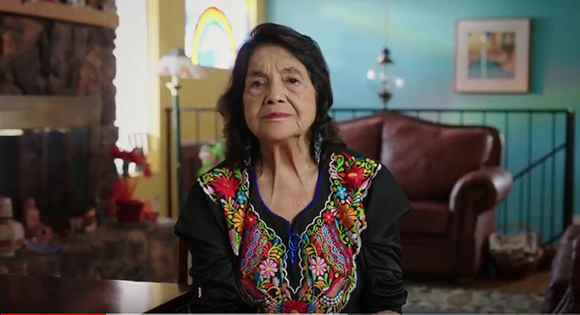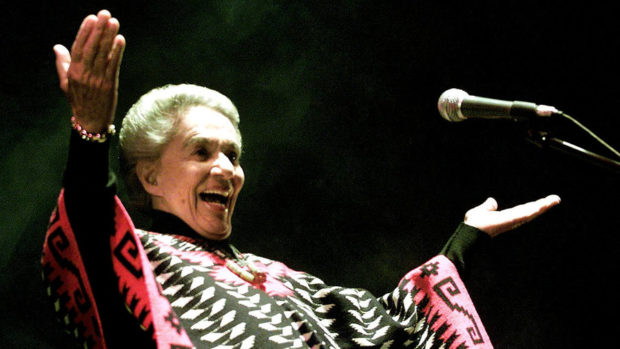
 Two biographical films tell the stories of two remarkable women: Dolores Huerta, co-founder of the United Farm Workers; and Chavela Vargas, groundbreaking ranchera singer.
Two biographical films tell the stories of two remarkable women: Dolores Huerta, co-founder of the United Farm Workers; and Chavela Vargas, groundbreaking ranchera singer.
Dolores, directed by Peter Bratt, profiles the activist and organizer Dolores Huerta, co-founder with Cesar Chavez of the United Farm Workers union. Of course, most people have heard of Chavez, but many don’t know about Huerta. The movie details how she started as a community organizer in Stockton, California, where she focused on improving the economic conditions of Latinos. Her seemingly boundless energy brought her to the attention of Chavez, and together they began the historic efforts to organize the exploited and mistreated farm workers in California and eventually the entire Southwest. While Chavez excelled in the job of creating a public relations presence for the union, a lot of the lobbying and strike organizing work, including the famous grape boycott in the late 1960s, fell to Huerta, who was the chief negotiator of the landmark collective bargaining agreement of 1970 that helped cement the UFW’s influence.
The film documents all this with copious footage from Huerta’s long career as an activist, along with lots of interviews with her family and associates. Best of all, we get to hear from Dolores herself, still alive and a force to be reckoned with at 87. The picture inspires deep respect and awe at her amazing accomplishments, not only in the face of the racism and anti-Chicano attitudes confronting her and the farm workers for decades, but the sexism that was rampant even within the ranks of the labor movement. There were many men who did not appreciate the presence of a strong, no-nonsense woman in the forefront of their union.
And the movie doesn’t sidestep the personal issues that were often cited against her by opponents. Huerta had eleven children with two marriages and a third partner, and her total dedication to the cause meant that she sacrificed a great deal of time that could have been spent with her kids. In fact, some of the best interviews in the film are with her grown children, all of whom express their pride in her and belief in her cause, and at the same time relate the sadness and loneliness they experienced as kids with a largely absent Mom. After not being elected union head after Chavez’s death, another injustice, Huerta created her own foundation and expanded her mission to include women’s rights and empowerment. Dolores is a thorough and totally absorbing portrait of a great American.
The spotlight falls on an extraordinary woman of a different kind in Chavela, directed by Catherine Gund and Daresha Kyi. I’m sorry to say I was unaware of Chavela Vargas, a torch singer of ranchera music in Mexico. Born in Costa Rica, she ran away at an early age and gradually made a name for herself in 1930s Mexico City. Chavela wore pants instead of dresses, and rejected all the usual feminine affectations expected from women singers in Mexico. Her deep contralto shook with passionate emotion and sadness, elevating ranchera to a tragic artistic level. Although she had a strong gay fan base—one person interviewed says that every lesbian in Mexico knew and loved her music—she didn’t come out publicly until she was in her 70s.
 Employing interviews with the singer herself, along with lovers, friends, and fans—the film is unsparing in its depiction of Vargas’s faults along with her strengths. Her alcoholism sabotaged her career until she finally got sober. Then, after a period of twenty years not singing, an invitation to perform in Spain revitalized her, and she worked tirelessly until her death at the age of 93. If, like me, you weren’t familiar with her work before, you won’t ever forget it after seeing Chavela, an exquisite love letter to a one-of-a-kind chanteuse.
Employing interviews with the singer herself, along with lovers, friends, and fans—the film is unsparing in its depiction of Vargas’s faults along with her strengths. Her alcoholism sabotaged her career until she finally got sober. Then, after a period of twenty years not singing, an invitation to perform in Spain revitalized her, and she worked tirelessly until her death at the age of 93. If, like me, you weren’t familiar with her work before, you won’t ever forget it after seeing Chavela, an exquisite love letter to a one-of-a-kind chanteuse.

